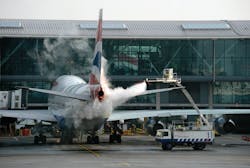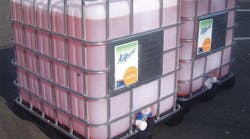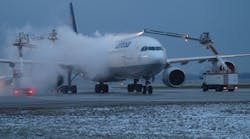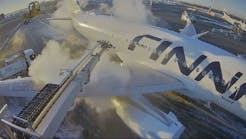Renewable Deicing
There is no question that the aviation industry plays an extremely important part in the world's transportation infrastructure.
According to its latest figures, the International Air Transport Association announced global traffic results for April showing that total passenger demand rose 6 percent year-over-year.
Despite continuing economic weakness in some parts of the world, demand for air travel continues to grow. The 6 percent overall growth recorded for April is above the 20-year trend.
At the same time, the aviation industry has responded positively to the need to sustain the world’s resources and environment. New aircraft entering today’s fleets, for example, emit 50 percent less carbon monoxide and 90 percent less smoke and unburned hydrocarbons than they did 50 years ago, according to the International Aerospace Industries Association.
Finally, total in the huge 15 percent of sales that aircraft and engine manufacturers devote to research and development, and you could argue that the aviation industry is already doing more than its fair share to combat climate change.
INCREASING SCRUTINY
However, legislation and voluntary agreements that aim to further reduce the environmental effects of flying will increasingly affect the aviation industry. Ever-increasing scrutiny will force airport operators and ground handling providers to reduce the carbon footprint of their operations and also comply with increasingly stringent pollution controls.
Suppliers have a real responsibility to support the industry with green alternatives. Most of today’s green news for our industry reports on advances to traditional combustion engines that power ground support equipment or that do without the engine entirely and use electricity to move heavy loads and even pushback planes.
Less well publicized are advances in deicing/anti-icing fluid. The Kilfrost research and development team, for example, in partnership with DuPont Tate & Lyle developed the company’s “Sustain” line, the first glycol made from corn sugar.
Kilfrost DFSustain ™ is qualified to SAEAMS 1424, and is currently manufactured in the United Kingdom as well as the United States, with plans in place to also manufacture in Asia.
DFSustain is a Type I de-icing fluid that is manufactured using a sustainable, bio-derived 1,3-propylene glycol called Susterra®.
Using a sustainable source for glycol has a dramatic and immediate impact on aviation’s carbon footprint and greenhouse gas emissions, by and large, in two ways:
- Estimates based on design data suggest that the consumption of 1 million liters (264,100 gallons) of DFSustain represents a savings of 20.9 million passenger kilometers (12.9 million miles) in terms of non-renewable energy, and a savings of 10.1 million passenger kilometers (6.2 million miles) in terms of greenhouse gases compared to standard glycol-based products. In terms of CO2, 1 million liters would see a potential but significant carbon reduction of 6,558 metric tons (7,228 tons).
- Producing the fluid uses 40 percent less non-renewable energy than standard glycol.
As an added overall benefit, the product itself is readily biodegradable and has low toxicity.
OTHER ADVANTAGES
But these environmental savings do not come at the cost of efficiency since DFSustain performs better than all existing propylene glycol deicers at low temperatures and can cope below minus 40 degrees Centigrade (which is also minus 40 degrees Fahrenheit). This in itself can also have cost and environmental saving since less product needs to be applied, and it has a longer holdover.
In addition, DFSustain also offers a unique performance enhancement in comparison to Type I fluids manufactured with regular 1,2-propylene glycol. Susterra® (1,3-propylene glycol) has a slightly different chemical structure to 1,2-propylene glycol and this results in DFSustain being characterised by lower viscosities at lower temperatures.
This means that DFSustain has improved aerodynamic/flow-off properties at lower temperatures than Type I fluids that contain regular 1,2-propylene glycol. This opens up the application of DFSustain to more extreme climates that are typically dominated by ethylene glycol-based Type I products.
Other suppliers to the aviation industry are also working to provide sustainable alternatives and soon, major greenhouse gas savings will be made before an aircraft even taxis to the runway.
Certainly, the environmental issues that we all face are increasing and urgent, and while as an industry we are certainly far from the worst offenders, we still do not have the luxury of waiting for other areas of commerce to catch up with us. We need to continue to lead and demonstrate our commitment to develop better, cleaner and more efficient methods of operating our aircraft, as well as managing our ground operations.
About the Author: Gary Lydiate is CEO of Kilfrost, which has customers in more than 63 countries on five continents.








